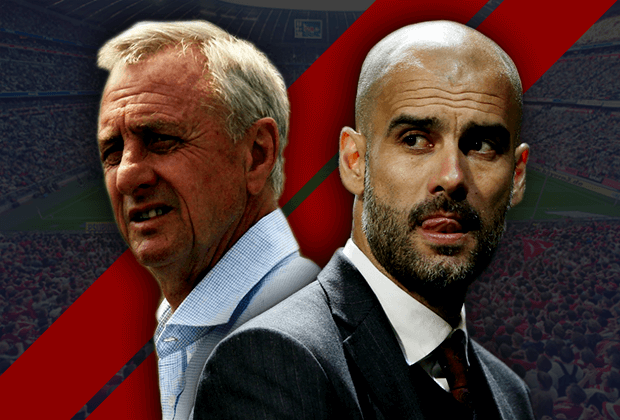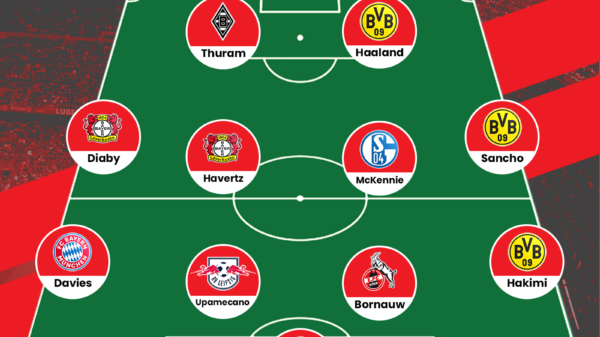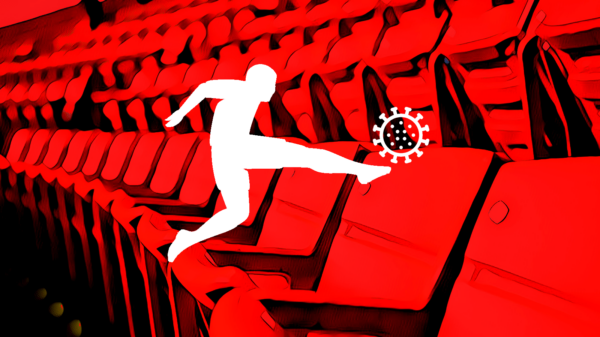Josep Guardiola hasn’t been positively welcomed since stepping foot in Germany, with every move of his criticised almost immediately and many questioning his authenticity as a great manager. Here, Jamie Scrupps talks about why we should know better than to question the former Barcelona manager.
“Good artists copy, great artists steal.” The quote by Picasso should tell you that great people don’t just come up with great ideas, but take all the best ideas from the greatest minds and apply them to their own visions.
There are many in the game with the opinion that Pep has taken Bayern backwards and is not a great manager – inheriting two great squads.
The recent first leg loss to Barcelona may have hurt Guardiola. It would be naïve to call his tactics naïve but they were certainly found out by the pace of Barca’s attack and the sheer class of Lionel Messi. However, the second leg showed more of what Guardiola is about. And, if the team’s defending hadn’t been so sloppy, they may very well have got back into the tie.
When coming into a team that had just won a treble under Jupp Heynckes, anything less than a treble would be a disappointment. He won the league in record time, as well as the German Cup against their rivals, Borussia Dortmund. Admittedly, a very poor performance against Madrid in the semifinals of the Champions League raised questions about whether he really had improved the team.
But Pep is a great artist. There is nothing new about his philosophies in the game. Possession football or ‘Tiki-Taka’ (a term he says he does not like) was not new to football before he came to manage Barcelona. The Dutch had played in this way before the Spanish, and the Hungarians had used the ‘false 9’ long before Pep too.

Below are three traits that mark out why Pep Guardiola is a great manager.
Never ending quest to learn
This illustrates exactly what Pep is about. Before he joined the Barcelona B team, he spent years travelling to different destinations to discover how different managers best employ tactics to get results. He has even said that he believes Marcelo Bielsa to be the best tactician in the world, after going to Argentina to gain all he could from him. As well as Bielsa, he’s also learned from: Juanma Lillo on the physical and nutritional side of the game, Ricardo La Volpe, Cesar Luis Menotti and one of the greats: Johan Cruyff.
Marti Pernarnau, the author of ‘Pep Confidential’, gave a list of reasons why he believed Pep to be the best in the world. One that I found especially interesting was that he has ‘childlike curiosity’, meaning he is constantly trying to learn from other people. Always asking questions and getting their perspective on matters.
This idea of asking questions a lot leads him to question whether certain views and beliefs within football are correct. His view seems to be to doubt everything until it has been proven to work. As Charlie Munger once said: “Avoid extreme ideologies because they can cloud your mind”. Pep has clearly taken this on, especially when you consider how many different formations he has used over the years. He is not scared to change up his system slightly (or quite radically), but he still maintains his general principle of playing with the ball, rather than without it.
One thing we cannot underestimate in what has helped Guardiola enormously, is playing in the ‘Dream Team’ with Barcelona in the 90’s. With some of the greatest players the club has ever seen, and under one of the greatest managers ever in Cruyff (as well as, let’s not forget, his future rival, Jose Mourinho). The amount of knowledge that these people could give him is incomprehensible. Let’s also not forget that four of the managers in the Champions League quarter finals this year were players from that team. With the knowledge that was communicated within these great footballing minds, it is not hard to see why Pep was successful so quickly.
Since then, Cruyff has always given guidance to Pep’s managerial skills, and advised on anything Pep was unsure of. Before his final season, he realised that he was going to have a hard time motivating his players in the same way he used to. He asked Cruyff what the best approach would be. Cruyff told him to get rid of the players causing the most problems.
Relationship with players
The above advice from Cruyff led to a problem for Pep because, as you see every game when his team scores, he has a strong connection with his players and fights for them as much as he can. Being told that he would have to sever ties with these players was not the answer he wanted.
It is all well and good saying that Pep has had the best players to manage in his time, but that would be overlooking how difficult it can be to keep the best players in check. Eto’o and Ronaldinho are two examples of this. It was well documented that Ronaldinho was beginning to get more into the partying lifestyle than the footballing lifestyle, apparently having naps in the gym after a heavy night out.
As Guillem Balague says in his book ‘Pep Guardiola: Another Way of Winning’: “… he [Pep] realised very early on that his job consisted of looking after these small bubbles of isolation, caressing the egos of his pupils and constantly directing their intentions and efforts to the benefit of the group”.
The first thing Pep did when he got there? Get rid of a player who is possibly one of the most iconic names in Barca’s history; Ronaldinho. It was a decision that may not have gone down well with all the fans (or the marketing department, for that matter), but proved to be exactly what the team needed in order to allow Leo Messi to develop and have a more cohesive group of players.
But it’s not just about the decisions to sacrifice players for the team (we’ll leave the Ibrahimovic debate for another day), because Pep also has a strong positive connection with the players.
From the first day he was officially in charge of the club, Pep began by setting out exactly what he expected from his players and how they would achieve it. It started with the philosophy of ‘everything with the ball’. The keeper would play more with his feet than his hands, the centre-backs would split to allow the wing-backs to bomb on, the pivot would come to collect the ball from between the two centre-backs. All these ideas were given to the players with a real conviction in the belief that they were what was best for the team.
The respect from Pep’s players comes from the passion in which he communicates with them. Watch every time he congratulates each individual player after the game. It usually comes with a big slap on the back, a hug or a huge smile. Similarly, he does not shy away from expressing when he is disappointed in what his team does. You can see how animated he gets when he is displeased with something he sees.
I imagine he laughs at Thomas Muller’s antics as much, if not more, than the rest of us.
Never ending tactical innovations
One thing, and perhaps one of the most recognisable things about a Guardiola side, is the strange and wonderful systems that are employed. At Barcelona, it began with four at the back, before moving to three. And then, occasionally to a ‘two-and-a-half’ at the back, with Busquets playing as almost a very high ball-playing defender.
Recently, I recall seeing a system at Bayern where they started off with what seemed like a normal 4-3-3. But, in attack, the full backs moved into central midfield, the pivot moved into central defence and the two original central midfielders moved further up as second strikers.
As I stated in a recent article regarding England’s flawed youth system, we have a real negative look on changing up the styles. Against San Marino, we played four defenders against one of the weakest opponents we will ever come up against. Would Guardiola do that? No. In defence, he has played: Lahm, Alaba, Mascherano, Martinez, Busquets and Yaya Toure. While you might say that he is lessening their impact on games by playing them in a position that can expose their weaknesses, that would be the negative (British) view on it. Pep considers this from the point of view of playing exactly how he wants to play.
The constant chopping and changing on the pitch as the game is in progress is fascinating. I saw a wonderful example of this when Bayern played Arsenal last season. About halfway through the first half, Kieran Gibbs went off injured, with Monreal taking his place. Pep immediately moved Robben and Gotze out to the right to double up on the new player who might need time to get into the match. And sure enough, Bayern scored after build up play coming from that flank.
“The secret to football is to overload one side of the pitch, then switch the play and score from the other side. Tiki-Taka is a load of nonsense!” This quote by Pep is not what you would expect, but it gives you some insight into what he believes is fundamental in football: winning matches. As we come into debates about ‘boring football’, even the person who plays ‘beautiful football’ admits that there is no point in playing that way if you don’t win games.
Summary
It is not any one of these traits that mark Pep as the best. It is the combination of all. His tactics would not be relevant if his players didn’t respect him and buy into his philosophy, and he would not be able to think of all these tactics if he was not constantly learning new ideas. His willingness to learn (or, ’steal ideas’), is what has accelerated his career from a rookie, Barca B coach, to arguably the best coach in the world.
An average of a trophy every 18 matches is a fantastic record. Say what you want; Pep’s teams are boring, they pass for the sake of it, they try to walk the ball in. As I said earlier, football is pointless if you don’t win games, and Pep certainly wins games.
Written by Jamie Scrupps
- Fair play to Raheem Sterling for demanding a move to Man City? - July 15, 2015
- Pep Guardiola: The man behind the manager - May 20, 2015
- England’s flawed youth system: How can they improve? - April 21, 2015


























































